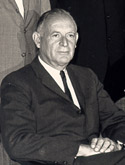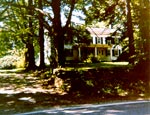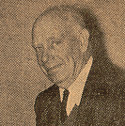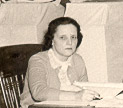 The history of a community is like a fine piece
of cloth, which is woven in time, and ever changing. The weaving begins with the
warp, the threads that form the foundation of the cloth. All of the daily events
that affect a community, both good and bad, past and present, are the essence of
that community, the threads that give shape to its future.
The history of a community is like a fine piece
of cloth, which is woven in time, and ever changing. The weaving begins with the
warp, the threads that form the foundation of the cloth. All of the daily events
that affect a community, both good and bad, past and present, are the essence of
that community, the threads that give shape to its future.
However, it’s the weft, the threads that are
drawn over and under the foundation that gives the tapestry its color and
beauty. The people of a community are the weft, and as their lives change, the
historic picture changes, too.
Yorktown’s written history is well documented,
but to know the history of its people, we must turn to the scant collection of
diaries, letters and oral histories that have been left behind.
Some interesting oral histories from the last
century have survived, thanks to a few dedicated people in the past who
recognized the need to preserve personal recollections of Yorktown’s life-long
residents. These are our window into the everyday world of early Yorktown.
One of these people was former Westchester County
Historian Allison Albee, who was a former president of the Westchester County
Historical Society and editor of “The Westchester Historian”. He conducted
interviews with local residents from 1937 until 1977 as research for the many
articles he wrote. These will be added to our Research
Archives.
In the 1960’s, Yorktown Historian Cortland
Auser, along with his wife Doris (Co-editors of “The Westchester Historian”),
Arthur C. Lee and Estelle O’Neil, interviewed many “old timers”, some of
which follow. The more extensive interviews will be added to our Research
Archives, along with two memorials already published: “Oral History of Sarah
M. Dingee, November 27, 1918”, which highlights the history of the Shrub Oak
Methodist Church; and “Changes I Have Seen Over 85 Years” by Arthur C. Lee.
The following interviews were conducted by
Estelle O’Neil on May 15-16, 1969.
Theodore (Ted) Hill, Jr., former Yorktown
Supervisor from 1928 - 1937, age 72:
 “Brother Cornell [is] deceased. They lived on a
large farm of which they have sold 217 acres. They remain with 17-18 acres. The
farm had 50 cows, which were hand-milked daily. Milking machines were installed
25 years ago. [They] still have the old dairy barns. [He] attended one-room
school, then Shrub Oak
School. Had 2 teachers, 2 rooms, then Oakside High
School, Peekskill. He attended Amherst State College, married Susan Perry, whose
father was a Doctor, has one daughter and 3 granddaughters.
“Brother Cornell [is] deceased. They lived on a
large farm of which they have sold 217 acres. They remain with 17-18 acres. The
farm had 50 cows, which were hand-milked daily. Milking machines were installed
25 years ago. [They] still have the old dairy barns. [He] attended one-room
school, then Shrub Oak
School. Had 2 teachers, 2 rooms, then Oakside High
School, Peekskill. He attended Amherst State College, married Susan Perry, whose
father was a Doctor, has one daughter and 3 granddaughters.
 He attended church
and went to Box Socials. There was one General Store - John W. Birdsall.
Coal
stove in the center of the store [and] a cracker barrel, everyone came there
[until] it burned in 1916. Where the shopping center and bank is located (Ed.-
Jefferson Valley) was a pasture which Hill brothers rented. The Catholic School
was the Willowbrook Farm. The Methodist Church in Shrub Oak celebrated 100th
anniversary 1964-66. The Library building and lands belonged to Mrs. K. Dresser,
deceased. Her father was John C. Hart, druggist. Old Route 6 was [Route] 309,
Crompond is Route [202] and was relocated, 1931, new Route 6. [The Westchester
County] Board of Supervisors has been voted out of being.”
He attended church
and went to Box Socials. There was one General Store - John W. Birdsall.
Coal
stove in the center of the store [and] a cracker barrel, everyone came there
[until] it burned in 1916. Where the shopping center and bank is located (Ed.-
Jefferson Valley) was a pasture which Hill brothers rented. The Catholic School
was the Willowbrook Farm. The Methodist Church in Shrub Oak celebrated 100th
anniversary 1964-66. The Library building and lands belonged to Mrs. K. Dresser,
deceased. Her father was John C. Hart, druggist. Old Route 6 was [Route] 309,
Crompond is Route [202] and was relocated, 1931, new Route 6. [The Westchester
County] Board of Supervisors has been voted out of being.”
A more detailed interview was conducted with Mr.
Hill by Doris Auser and Arthur C. Lee in 1972, which corrected some of the above
information, like the name of his brother James Curry Hill, his mother Susan
Curry and wife Laura Race. See Research
Archives.
Lester Perry, age 72:
 “[He was] born on the other side of the lake.
Father [was] Munson Perry, mother Mary Austin…daughter is Mrs. Van de Hoek.
Lived on Perry’s Farm [and had] 12 cows, chickens, sold calves, had an apple
orchard. Grandmother (Austin) had the adjoining farm. Had a brother Henry,
deceased. Went to a one-room school in Jefferson Valley near the cross-roads of
Route 6 and Gomer St., then [attended] Mohegan Lake Military
School. Schoolhouse had one
teacher who taught 9 grades to 40-50 pupils, played tag, rode a bicycle. [Went
to] church Shrub Oak Methodist. There was a Union Chapel with alternating clergy
- Methodist, Baptist, Presbyterian on Sunday afternoons and a Sunday School in
Jefferson Valley (south side of road, building still there as house), vicinity
of Gas Station. Went to private house parties and suppers, …called Sociables.
Women had a Sewing Circle. The General Store was on the other side of Valley
Market. This side of the market (near Perry St.) was O’Neil’s Saloon. Had a
Saloon in the white apartment house near Nino’s. Sparkle and Junior [Lakes]
are man made lakes on the land of Chester Hyatt. In 1924 Mr. Merk developed
Sparkle Lake (Ed. - read “The Ol’ Swimmin’Hole”). The Perry Farm was
sold in building lots in 1924…then again in 1940-50.”
“[He was] born on the other side of the lake.
Father [was] Munson Perry, mother Mary Austin…daughter is Mrs. Van de Hoek.
Lived on Perry’s Farm [and had] 12 cows, chickens, sold calves, had an apple
orchard. Grandmother (Austin) had the adjoining farm. Had a brother Henry,
deceased. Went to a one-room school in Jefferson Valley near the cross-roads of
Route 6 and Gomer St., then [attended] Mohegan Lake Military
School. Schoolhouse had one
teacher who taught 9 grades to 40-50 pupils, played tag, rode a bicycle. [Went
to] church Shrub Oak Methodist. There was a Union Chapel with alternating clergy
- Methodist, Baptist, Presbyterian on Sunday afternoons and a Sunday School in
Jefferson Valley (south side of road, building still there as house), vicinity
of Gas Station. Went to private house parties and suppers, …called Sociables.
Women had a Sewing Circle. The General Store was on the other side of Valley
Market. This side of the market (near Perry St.) was O’Neil’s Saloon. Had a
Saloon in the white apartment house near Nino’s. Sparkle and Junior [Lakes]
are man made lakes on the land of Chester Hyatt. In 1924 Mr. Merk developed
Sparkle Lake (Ed. - read “The Ol’ Swimmin’Hole”). The Perry Farm was
sold in building lots in 1924…then again in 1940-50.”
Floyd Barger, about 72 years old:
“[He was] born on Indian Hill. In 1902-3 moved
to Smith’s. From 10-14 years of age to Zickner, then Mackler’s (Dairy) Farm
[with] 60-70 cows. In 1919 moved back to Indian Hill Farm. Married Minnie Magley,
a Copake school teacher. She taught in the old school on Wallace’s Farm, then
the school reverted to Mackler’s place. [Mr. Barger]’s daughter teaches. She
is Mrs. Jo-Anne Charles Ably, has 2 sons, one [in] Air Crops, the other in Navy.
[Mr. Barger]’s grandfather Mordecai Perry, married Joanne Beyea from Baldwin
Place. [Mr. Barger] sold milk (hand-milked 60-70 cows) to Chester Hyatt. In
Peekskill [he] took the milk to [the] railroad station. He would put his horse
and wagon in his cousin’s barn on Orchard St., Peekskill, took the trolley to
school (Oakside), then return and take his horse and wagon home, about 8 or 10
miles every day. He drove a school bus for the district school of Shrub Oak. At
that time there were 272 children, 2 buses for Shrub Oak and Lake Mohegan areas.
He raced his own horses in Maine and New Hampshire. [He] worked nights at
Yonkers Raceway for 5 years as a timer on trotters and pacers. General Store in
Jefferson Valley was where the Saloon is. Lester Perry is his cousin. Sparkle
Lake was on Chester Hyatt’s Farm which was dammed up and formed [an] ice pond.
Junior Lake was made by Col. Paine.”
Ed Kear:
“Wife [is] Minna Snowden, daughter of Dr. Fred
A. Snowden of Peekskill. [He lived on what is now] Beaver Farm - 360 acres. 50
cattle, 5 farm horses, 4 carriage horses, chickens, geese, turkeys, ducks. [He]
brought milk to the Depot. [The] barn burned in 1900, all stock lost. [Another]
barn burned in 1910-1911 when Mr. Beaver owned the farm. Railroad was built
about 1880. [It had] 5 switch tracks, 3 or 4 engines, water tower. Sometimes
engines and trains stayed over for loading. Opposite his office was the first
Catholic Church. Tompkins Hall is the Kohl Building, now one story. Carpenter
Hotel or Whitney House is now gas station. Dunning Garage and apartment building
is now a shell gas station on Kear St. Roak residence on Commerce St. is a gas
station. McKeel residence on Commerce St. is the Catalo Bldg. Junior Lake on
Col. Paine’s land was sold to a development company - Halyan Co. in Wh.
Plains. [We] had church festivals, and 2 or 3 dances per year at Tompkins Hall.
His son Edward, Jr. is a Cornell graduate.”
Mrs. Katherine Wyand, former Yorktown Town Clerk:
 “[Her] father was William C. Kear, born on Beaver Farm.
[Her] mother was Louisa Syze [from the] Baldwin area. [Her] grandfather was
Henry C. Kear and grandmother Katherine Farmer who came from Ireland. She has a
son Stuart Wyand. [She] attended a 4-room
schoolhouse, her first teacher was
Alice Stansbury [who] taught her 1st and 8th
grades. She was the first in her family (being the youngest) to complete her
schooling in Yorktown. Other children went by railroad to Tarrytown, Briarcliff
or Peekskill. [The] schoolhouse was where St. Patrick’s Church is located. Her
second teacher was Mary Whitney who married John A. Weyant. Mrs. Wyand lives
across the street from Town Hall in the house her father built. The center of
Town was by the Presbyterian
Church, on Route 202. In order to bring the
railroad to Yorktown, her grandfather gave all the land where the tracks lie,
free without remuneration, to the railroad with this one provision - that all of
the trains must stop in Yorktown. Then when they needed a turntable he gave the
land with a provision that when the railroad no longer used the turntable the
land would revert to the family. (Ed. - the family later sued for the return of
title, but lost in the courts.) McKeel’s General Store sold grain, feed,
groceries, etc. situated in Tompkins Hall building opposite the Depot. On the
2nd floor [there was] dancing, plays and voting. Now it is a one-story building.
There was a blacksmith’s shop where the Highway Bldg. [is]. Mitchell’s
Hardware building was originally where the livery stable was.”
“[Her] father was William C. Kear, born on Beaver Farm.
[Her] mother was Louisa Syze [from the] Baldwin area. [Her] grandfather was
Henry C. Kear and grandmother Katherine Farmer who came from Ireland. She has a
son Stuart Wyand. [She] attended a 4-room
schoolhouse, her first teacher was
Alice Stansbury [who] taught her 1st and 8th
grades. She was the first in her family (being the youngest) to complete her
schooling in Yorktown. Other children went by railroad to Tarrytown, Briarcliff
or Peekskill. [The] schoolhouse was where St. Patrick’s Church is located. Her
second teacher was Mary Whitney who married John A. Weyant. Mrs. Wyand lives
across the street from Town Hall in the house her father built. The center of
Town was by the Presbyterian
Church, on Route 202. In order to bring the
railroad to Yorktown, her grandfather gave all the land where the tracks lie,
free without remuneration, to the railroad with this one provision - that all of
the trains must stop in Yorktown. Then when they needed a turntable he gave the
land with a provision that when the railroad no longer used the turntable the
land would revert to the family. (Ed. - the family later sued for the return of
title, but lost in the courts.) McKeel’s General Store sold grain, feed,
groceries, etc. situated in Tompkins Hall building opposite the Depot. On the
2nd floor [there was] dancing, plays and voting. Now it is a one-story building.
There was a blacksmith’s shop where the Highway Bldg. [is]. Mitchell’s
Hardware building was originally where the livery stable was.”
The Yorktown Historical Society updates the home page with seasonally appropriate
articles and information. Click here to
read our past issues.
 The history of a community is like a fine piece
of cloth, which is woven in time, and ever changing. The weaving begins with the
warp, the threads that form the foundation of the cloth. All of the daily events
that affect a community, both good and bad, past and present, are the essence of
that community, the threads that give shape to its future.
The history of a community is like a fine piece
of cloth, which is woven in time, and ever changing. The weaving begins with the
warp, the threads that form the foundation of the cloth. All of the daily events
that affect a community, both good and bad, past and present, are the essence of
that community, the threads that give shape to its future.


